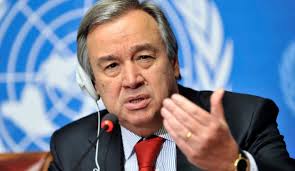By Chuks Oyema-Aziken
United Nations Secretary General, António Guterres has again noted that the end of the fossil fuel age is an economic inevitability, saying new national plans must accelerate the shift, and help to ensure it comes with justice.
In his closing statement to end COP29 hosted by the Azerbaijanian government, he
charged countries to deliver new economy-wide national climate action plans or NDCs aligned with 1.5 degrees, well ahead of COP30 as promised.
Guterres noted that finance has been priority number one with developing countries swamped by debt, pummelled by disasters, and left behind in the renewables revolution in desperate need of funds.
“An agreement at COP29 was absolutely essential to keep the 1.5 degree limit alive. And countries have delivered. I had hoped for a more ambitious outcome – on both finance and mitigation – to meet the great challenge we face.
He urged that commitments must quickly become cash and be honoured in full and on time.
“All countries must come together to ensure the top-end of this new goal is met.
COP29 also builds on progress made last year on emissions reductions and accelerating the energy transition. And it reaches agreement on carbon markets.
“This was a complex negotiation in an uncertain and divided geopolitical landscape. I commend everyone who worked hard to build consensus. You have shown that multilateralism – centred on the Paris Agreement – can find a path through the most difficult issues.
“I appeal to governments to see this agreement as a foundation – and build on it.
First, countries must deliver new economy-wide national climate action plans – or NDCs – aligned with 1.5 degrees, well ahead of COP30 – as promised. The G20 countries, the biggest emitters, must lead.
“These new plans must cover all emissions and the whole economy, accelerate fossil fuel phase out, and contribute to the energy transition goals agreed at COP28 – seizing the benefits of cheap, clean renewables.
“The end of the fossil fuel age is an economic inevitability. New national plans must accelerate the shift, and help to ensure it comes with justice.
“Second, we need swift action to deliver on commitments made in the Pact for the Future. Particularly on effective action on debt; increasing concessional finance and improving access; and substantially increasing the lending capacity of the Multilateral Development Banks, with adequate recapitalization.”
.



